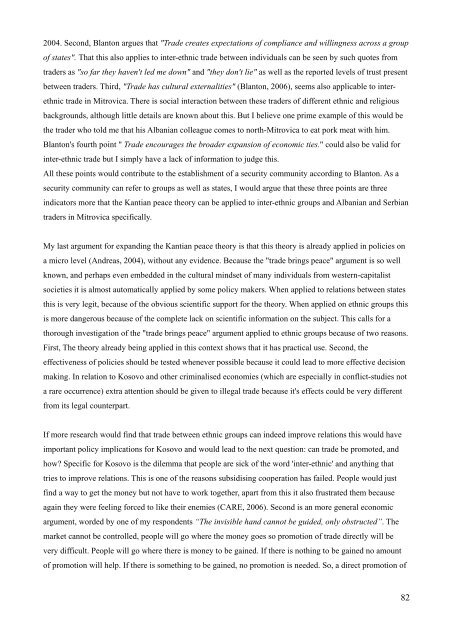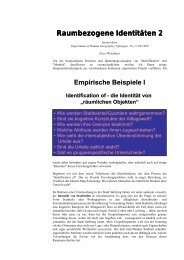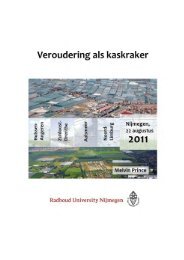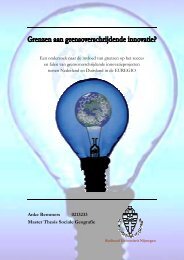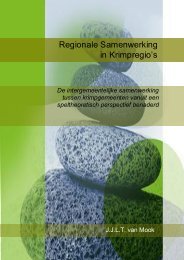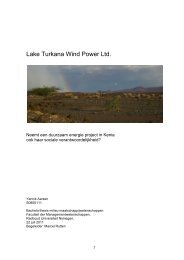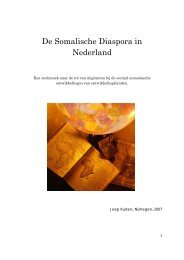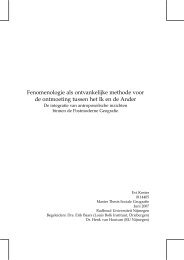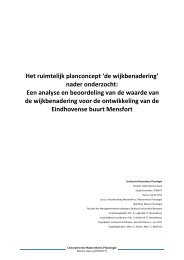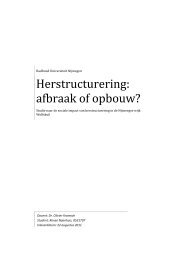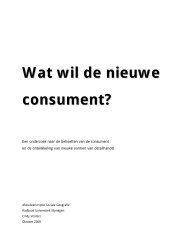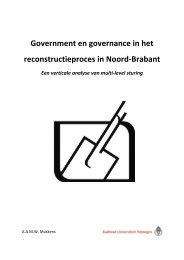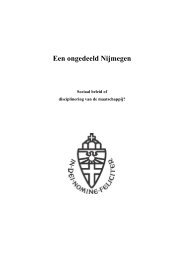Trading with the enemy in Mitrovica, Kosovo. - RUhosting
Trading with the enemy in Mitrovica, Kosovo. - RUhosting
Trading with the enemy in Mitrovica, Kosovo. - RUhosting
Create successful ePaper yourself
Turn your PDF publications into a flip-book with our unique Google optimized e-Paper software.
2004. Second, Blanton argues that "Trade creates expectations of compliance and will<strong>in</strong>gness across a group<br />
of states". That this also applies to <strong>in</strong>ter-ethnic trade between <strong>in</strong>dividuals can be seen by such quotes from<br />
traders as "so far <strong>the</strong>y haven't led me down" and "<strong>the</strong>y don't lie" as well as <strong>the</strong> reported levels of trust present<br />
between traders. Third, "Trade has cultural externalities" (Blanton, 2006), seems also applicable to <strong>in</strong>terethnic<br />
trade <strong>in</strong> <strong>Mitrovica</strong>. There is social <strong>in</strong>teraction between <strong>the</strong>se traders of different ethnic and religious<br />
backgrounds, although little details are known about this. But I believe one prime example of this would be<br />
<strong>the</strong> trader who told me that his Albanian colleague comes to north-<strong>Mitrovica</strong> to eat pork meat <strong>with</strong> him.<br />
Blanton's fourth po<strong>in</strong>t " Trade encourages <strong>the</strong> broader expansion of economic ties." could also be valid for<br />
<strong>in</strong>ter-ethnic trade but I simply have a lack of <strong>in</strong>formation to judge this.<br />
All <strong>the</strong>se po<strong>in</strong>ts would contribute to <strong>the</strong> establishment of a security community accord<strong>in</strong>g to Blanton. As a<br />
security community can refer to groups as well as states, I would argue that <strong>the</strong>se three po<strong>in</strong>ts are three<br />
<strong>in</strong>dicators more that <strong>the</strong> Kantian peace <strong>the</strong>ory can be applied to <strong>in</strong>ter-ethnic groups and Albanian and Serbian<br />
traders <strong>in</strong> <strong>Mitrovica</strong> specifically.<br />
My last argument for expand<strong>in</strong>g <strong>the</strong> Kantian peace <strong>the</strong>ory is that this <strong>the</strong>ory is already applied <strong>in</strong> policies on<br />
a micro level (Andreas, 2004), <strong>with</strong>out any evidence. Because <strong>the</strong> "trade br<strong>in</strong>gs peace" argument is so well<br />
known, and perhaps even embedded <strong>in</strong> <strong>the</strong> cultural m<strong>in</strong>dset of many <strong>in</strong>dividuals from western-capitalist<br />
societies it is almost automatically applied by some policy makers. When applied to relations between states<br />
this is very legit, because of <strong>the</strong> obvious scientific support for <strong>the</strong> <strong>the</strong>ory. When applied on ethnic groups this<br />
is more dangerous because of <strong>the</strong> complete lack on scientific <strong>in</strong>formation on <strong>the</strong> subject. This calls for a<br />
thorough <strong>in</strong>vestigation of <strong>the</strong> "trade br<strong>in</strong>gs peace" argument applied to ethnic groups because of two reasons.<br />
First, The <strong>the</strong>ory already be<strong>in</strong>g applied <strong>in</strong> this context shows that it has practical use. Second, <strong>the</strong><br />
effectiveness of policies should be tested whenever possible because it could lead to more effective decision<br />
mak<strong>in</strong>g. In relation to <strong>Kosovo</strong> and o<strong>the</strong>r crim<strong>in</strong>alised economies (which are especially <strong>in</strong> conflict-studies not<br />
a rare occurrence) extra attention should be given to illegal trade because it's effects could be very different<br />
from its legal counterpart.<br />
If more research would f<strong>in</strong>d that trade between ethnic groups can <strong>in</strong>deed improve relations this would have<br />
important policy implications for <strong>Kosovo</strong> and would lead to <strong>the</strong> next question: can trade be promoted, and<br />
how? Specific for <strong>Kosovo</strong> is <strong>the</strong> dilemma that people are sick of <strong>the</strong> word '<strong>in</strong>ter-ethnic' and anyth<strong>in</strong>g that<br />
tries to improve relations. This is one of <strong>the</strong> reasons subsidis<strong>in</strong>g cooperation has failed. People would just<br />
f<strong>in</strong>d a way to get <strong>the</strong> money but not have to work toge<strong>the</strong>r, apart from this it also frustrated <strong>the</strong>m because<br />
aga<strong>in</strong> <strong>the</strong>y were feel<strong>in</strong>g forced to like <strong>the</strong>ir enemies (CARE, 2006). Second is an more general economic<br />
argument, worded by one of my respondents “The <strong>in</strong>visible hand cannot be guided, only obstructed”. The<br />
market cannot be controlled, people will go where <strong>the</strong> money goes so promotion of trade directly will be<br />
very difficult. People will go where <strong>the</strong>re is money to be ga<strong>in</strong>ed. If <strong>the</strong>re is noth<strong>in</strong>g to be ga<strong>in</strong>ed no amount<br />
of promotion will help. If <strong>the</strong>re is someth<strong>in</strong>g to be ga<strong>in</strong>ed, no promotion is needed. So, a direct promotion of<br />
82


